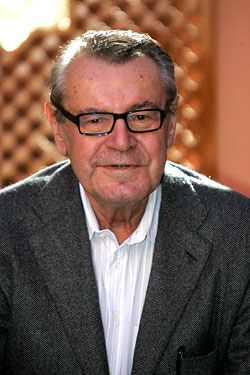
Milos Forman hasnÔÇÖt made that many movies ÔÇö fourteen features in 44 years, by our reckoning ÔÇô but heÔÇÖs certainly made them count. The Czech writer-director started off with the Iron Curtain classics Black Peter and Loves of a Blonde before running seriously afoul of authorities with 1967ÔÇÖsThe FiremenÔÇÖs Ball, which is currently being revived at BAM. But he truly came into his own in the U.S., where for more than three decades heÔÇÖs signed his name to such momentous (and often Oscar-winning) works as One Flew Over the CuckooÔÇÖs Nest, Amadeus, The People vs. Larry Flynt, and Man in the Moon. Along the way, Forman has seen the ravages of Nazism, the devastation of Communism, the craziness of the sixties, and the paranoia of the seventies. So, all things considered, it was pretty easy for him to answer VultureÔÇÖs questions.
ItÔÇÖs been 40 years since you made The FiremenÔÇÖs Ball. When was the last time you saw the film?
I saw it a few months ago, actually. IÔÇÖm very proud of it, and I have very tender feelings for it, because it was in the vault for twenty years in Czechoslovakia. In 1969, it was officially banned for eternity. Thank God ÔÇ£eternityÔÇØ in the Communist language means twenty years.
Did you anticipate such a strong reaction from the government when you made it?
I started making it during a time of relative relaxation of the censors, during the Dubcek era and the Prague Spring. But I was aware that this was a politically explosive subject, a satire of Communist society in Czechoslovakia. Still, I thought I was being clever: I arranged for a co-production with the Italian producer Carlo Ponti. I figured that even if the film didnÔÇÖt play in Czechoslovakia, at least it would get to play in the outside world. He invested $65,000, which was peanuts, but when he saw the film, he immediately asked the Czech government to give him his money back ÔÇö he didnÔÇÖt like the film! So I got a letter from the government saying they were going to sue me for sabotaging the Socialist economy. [Laughs.] ItÔÇÖs funny now, but back then, this carried a ten-year prison sentence. Fortunately, I got to show it to Francois Truffaut and Claude Berri. They liked it, they paid off Ponti, and I was off the hook. But it was not a pleasant situation.
What did the real firemen who were in the film think of it?
Practically 90 percent of the cast of that film are real firemen from that little town where I shot the film. The authorities decided they would show it to the people in that little town where the firemen lived. They were sure the film would upset them and this would give them a good reason to ban the film. But the firemen loved the film! They defended it. But it didnÔÇÖt stop the authorities from banning the film. But when you see the film, you realize itÔÇÖs not about firemen, itÔÇÖs about us.
Have you gone back to that town since?
Yes, and I met them again about twenty years later, when I was finally allowed to travel back to Czechoslovakia in the eighties. Most of them were still alive, and we talked and had a wonderful time. As a matter of fact, the local firemen have one day a year where they demonstrate their skills to the public. This year, the theme was FiremenÔÇÖs Ball, and they reenacted scenes from the film.
Were you disappointed at all with the critical response to GoyaÔÇÖs Ghosts? That seemed like a very personal film for you.
ItÔÇÖs still difficult to me because IÔÇÖm very proud of that film. IÔÇÖm depressed by the fact that it didnÔÇÖt get a better reaction. Obviously I must have done something wrong with the film.
Are you following Oscar season?
Let me tell you something: I think this year is a very strong year for cinema. IÔÇÖve seen several films I was very impressed with. I liked Slumdog Millionaire, Doubt, Rachel Getting Married.
There are also a number of Holocaust films being released. As someone who lost his parents during the Holocaust, do you feel this is a subject that can be properly treated on film?
Holocaust films will be made and should be made as long as we canÔÇÖt understand what makes people so cruel to each other. But this isnÔÇÖt just a Jewish theme. My parents died in concentration camps, and they were Protestants. WeÔÇÖll be trying to come to terms with this kind of cruelty forever.
YouÔÇÖve never really tackled this subject, though.
Right now IÔÇÖm preparing a movie about the 1938 Munich Conference, about the appeasement of Hitler by Chamberlain and others, to be shot sometime next year. ItÔÇÖs a fiction ÔÇö itÔÇÖs nonjudgmental. But this is the first time IÔÇÖve treated this subject. I was a child at the time, but I lived with the consequences of it for the rest of my life. ItÔÇÖs the biggest moral dilemma of the modern world, and weÔÇÖre still dealing with this question.


